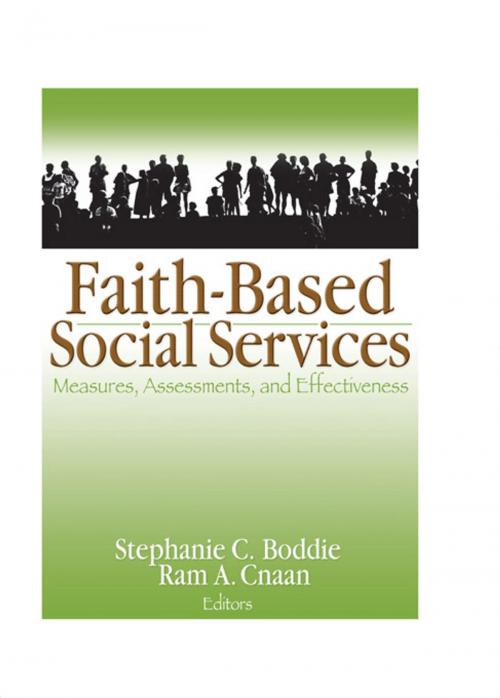Faith-Based Social Services
Measures, Assessments, and Effectiveness
Nonfiction, Health & Well Being, Medical, Patient Care, Health Care Delivery, Social & Cultural Studies, Social Science, Social Work, Allied Health Services| Author: | ISBN: | 9781135804916 | |
| Publisher: | Taylor and Francis | Publication: | November 12, 2012 |
| Imprint: | Routledge | Language: | English |
| Author: | |
| ISBN: | 9781135804916 |
| Publisher: | Taylor and Francis |
| Publication: | November 12, 2012 |
| Imprint: | Routledge |
| Language: | English |
Read the latest studies on the effectiveness of religious-based services—and the problems revealed in the assessment
The Charitable Choice provision and the Bush Administration’s National Faith-Based Initiative have broadened the scope of social services delivered through faith-based organizations. There are expectations that these faith-based social service providers will be more effective—but how should that effectiveness be measured? Faith-Based Social Services: Measures, Assessments, and Effectiveness explains the nature and quality of religion-based social service delivery while serving as a point of reference for future research and work. This unique source tackles the important, complex issue of measuring the effectiveness of faith-based social services in comparison to secular services while providing analysis of the latest available studies.
Faith-Based Social Services: Measures, Assessments, and Effectiveness provides a conceptual analysis of FBOs (faith-based organizations) that reflects the need to gather detailed studies to assess social service effectiveness while reviewing the crucial issues challenging public policy. The latest empirical research is detailed, including the problems found when comparing secular and faith-based social service providers, their organizational structures, and the types of services offered. Analysis is included of the data from a three-state evaluation of welfare to work programs, a study of four types of faith-based services found in four cities, and an assessment of a church-based program for teenage drop-outs.
Topics in Faith-Based Social Services: Measures, Assessments, and Effectiveness include:
-
discussion on how social science research shunned faith-based services and how this neglect affected effectiveness
-
problems inherent in efficacy assessment
-
making funding priorities decisions
-
the causes of outcome differences
-
a model of evaluation based on randomized controlled clinical trials
-
using measurement practices currently used by the nonprofit sector
-
comparative case studies in transitional housing, parent education, and residential substance abuse treatment programs
-
latest analysis of research involving faith-based organizations and the provided services’ efficacy
-
much more!
Faith-Based Social Services: Measures, Assessments, and Effectiveness is illuminating reading, perfect for social work professionals, students, educators, sociologists, religious leaders, and seminary educators.
Read the latest studies on the effectiveness of religious-based services—and the problems revealed in the assessment
The Charitable Choice provision and the Bush Administration’s National Faith-Based Initiative have broadened the scope of social services delivered through faith-based organizations. There are expectations that these faith-based social service providers will be more effective—but how should that effectiveness be measured? Faith-Based Social Services: Measures, Assessments, and Effectiveness explains the nature and quality of religion-based social service delivery while serving as a point of reference for future research and work. This unique source tackles the important, complex issue of measuring the effectiveness of faith-based social services in comparison to secular services while providing analysis of the latest available studies.
Faith-Based Social Services: Measures, Assessments, and Effectiveness provides a conceptual analysis of FBOs (faith-based organizations) that reflects the need to gather detailed studies to assess social service effectiveness while reviewing the crucial issues challenging public policy. The latest empirical research is detailed, including the problems found when comparing secular and faith-based social service providers, their organizational structures, and the types of services offered. Analysis is included of the data from a three-state evaluation of welfare to work programs, a study of four types of faith-based services found in four cities, and an assessment of a church-based program for teenage drop-outs.
Topics in Faith-Based Social Services: Measures, Assessments, and Effectiveness include:
-
discussion on how social science research shunned faith-based services and how this neglect affected effectiveness
-
problems inherent in efficacy assessment
-
making funding priorities decisions
-
the causes of outcome differences
-
a model of evaluation based on randomized controlled clinical trials
-
using measurement practices currently used by the nonprofit sector
-
comparative case studies in transitional housing, parent education, and residential substance abuse treatment programs
-
latest analysis of research involving faith-based organizations and the provided services’ efficacy
-
much more!
Faith-Based Social Services: Measures, Assessments, and Effectiveness is illuminating reading, perfect for social work professionals, students, educators, sociologists, religious leaders, and seminary educators.















